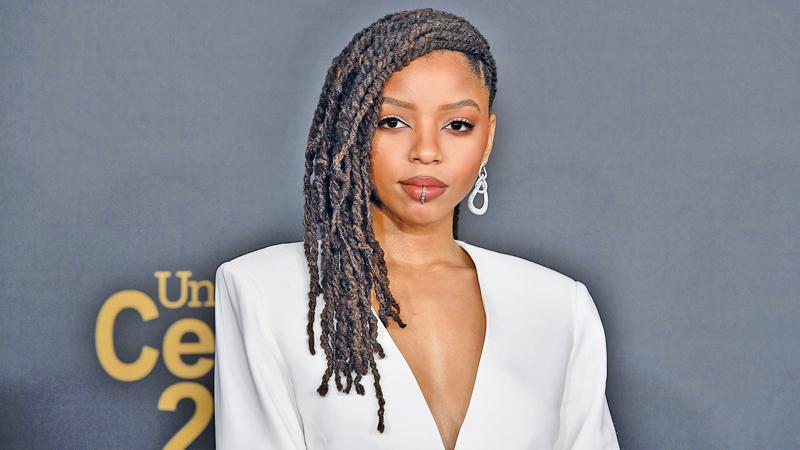
In this op-ed, author Sarah Raughley examines Chloe Bailey’s recent emotional video in the context of music industry racism and sexism.
Chloe Bailey got the internet talking. Then the internet made Chloe Bailey cry. What happened? The answer to that question, unfortunately, goes back centuries.
Let’s start with two weeks ago. Chloe has been promoting with her sister Halle for years under Beyoncé’s mentorship as the acting and singing girl group, Chloe x Halle. But recently, the girls have begun to establish their own identities as individuals. This new journey culminated in the two finally creating separate Instagram accounts.
From the time they were singing on YouTube as teens, Chloe x Halle have been known to have a soulful image that matched their rich vocals — kind of like a younger version of the R&B singing duo VanJess. Halle’s role as Ariel for Disney’s The Little Mermaid will likely see her maintaining that image for a while longer; the Mouse doesn’t play. But as for Chloe, she’s taken a different route to expressing her individuality: exploring her sexuality on Instagram in smoldering videos, including her viral #BussItChallenge, which caught the attention of fans and celebrities alike, including Drake.
Discussion
Chloe has gotten a lot of people talking in a short amount of time. Unfortunately, all the discussion surrounding her sensual videos eventually came to a head when Chloe finally broke down in a tearful video addressing her audience and critics. “It’s really hard for me to think of myself as a sexual being or an attractive being quite frankly,” she said, “so when I see all the uproar about my posts and stuff I’m a bit confused, like I really don’t understand because I’ve never seen myself in that way or in that light.”
In the words of Beyoncé, “you know that when you cause all this conversation.” But sometimes it’s more complicated than that. Black girls who venture into the music industry eventually find out just how complicated it really is to try to define themselves while meeting the demands of a problematic system entirely unwilling to sell a diverse array of images and narratives for Black girls.
The popular narrative the industry wants to sell of Black women is the same one people have been consuming for centuries: Black female hyper-sexuality. If you’re a Black girl trying to make it in music, it doesn’t matter who you really are inside. Hyper-sexuality is what audiences demand you be. A recent viral video of Rick Ross on the cancelled competition show Signed makes that clear. As he chooses Brittany over the vocally superior Kaiya (a move that many cited as an example of colourism), the industry politics and cultural fantasies that entrap Black women quickly come to light. You have to be considered sexy through a very specific lens, to succeed. Remember, Halle Bailey started her own personal Instagram as well, but only Chloe has been receiving inordinate amounts of attention from media and fans alike, some of whom are already speculating she’ll go solo while nonsensically pitting her against other talented and dedicated young Black singers like Normani, as if only one Black girl is allowed to shine at a time. What is this, Highlander?
Cruelty
The cruelty that puts Black girls in an itty bitty box and demands they battle for supremacy while performing the #BussItChallenge is a tiring phenomenon that exposes something sinister in the culture, and that includes the fan community. Why do fans only start paying attention to Black female artistes once they conform to a hyper-sexualised image? Why are Black women so limited in the kinds of images they can portray, lyrics they can sing and genres they can perform? And why do some people seem more interested in the gossip than actually supporting their favorite artists?
That last one’s a real head-scratcher. Hundreds of thousands of people follow the drama surrounding artists like Megan thee Stallion and Chloe Bailey. As many people pay attention to their provocative posts. Millions follow them on Instagram, but the same amount of people aren’t supporting their actual work. Chloe trended for her #silhouettechallenge, but how many people care that she is preparing for an upcoming collaboration with 6lack? Meanwhile, the people obsessed with the drama and messiness between Black girls attack those like Normani who they deem to be “too quiet” and “too boring” on social media.
To me, this indicates that people today demand Black female singers and rappers to be hyper-sexual, drama-inducing, and messy for their own amusement. They may not actually support those artistes monetarily, but they certainly won’t pay attention to a singer otherwise. It’s hard to talk about this subject without seeming like you’re siding with the likes of conservative pundits; indeed, women are often burdened by the patriarchal standards of chastity that cast them as either ‘,Madonnas’or whores’ This includes Black women whose own communities often expect church girl modesty at the same time that the wider mainstream craves hypersexualisation. But there’s nuance in this conversation that people shouldn’t miss. Fans often defend their own insatiable demand for Black girls’ bodies by citing body positivity and agency, forgetting the historical and contemporary structures of power in society and entertainment that reduce Black women to their bodies for profit.
Black girls enjoying their sexuality is one thing. But when Black girls are rewarded with attention and success only if they put their sexuality up for display? And when the demand for their bodies becomes so stressful that it makes them cry? Then we’ve got a problem.
